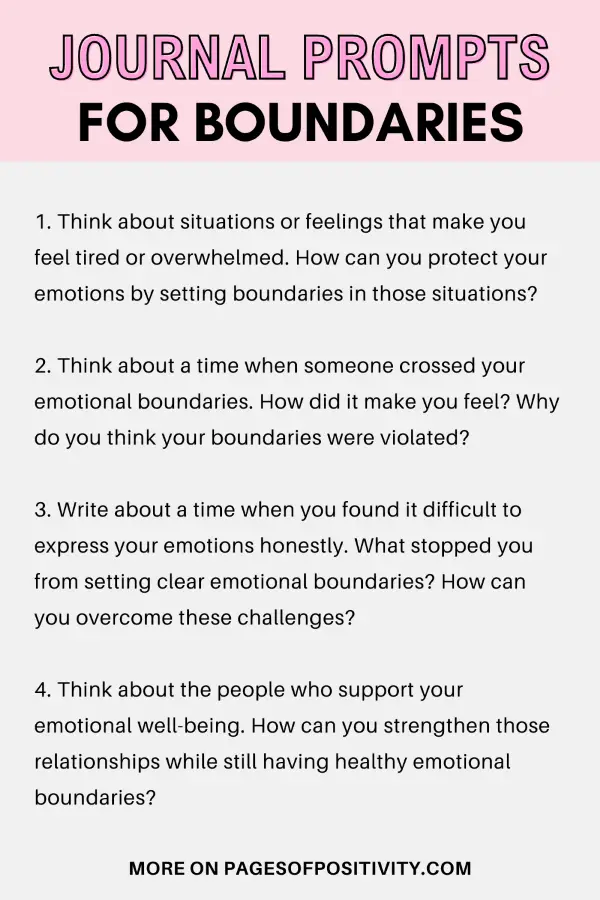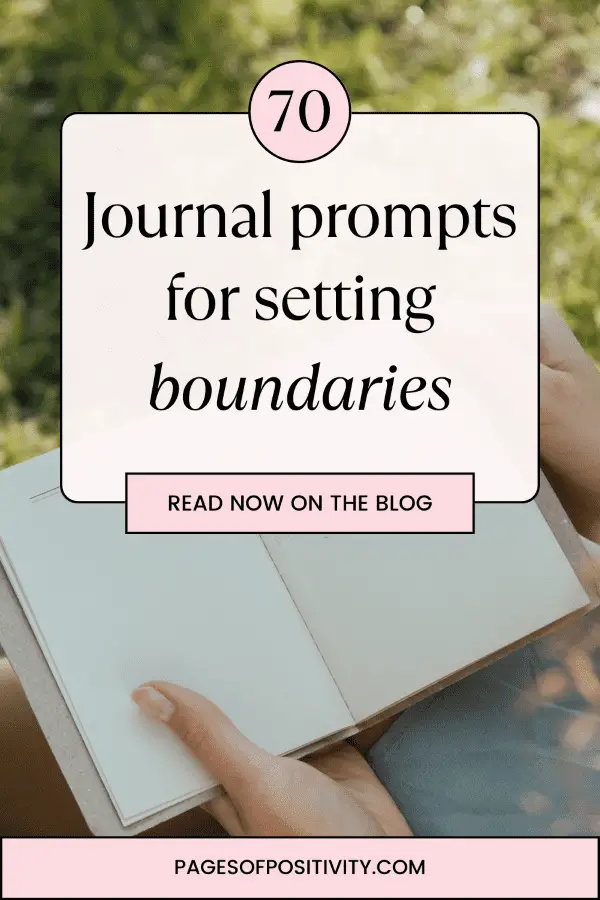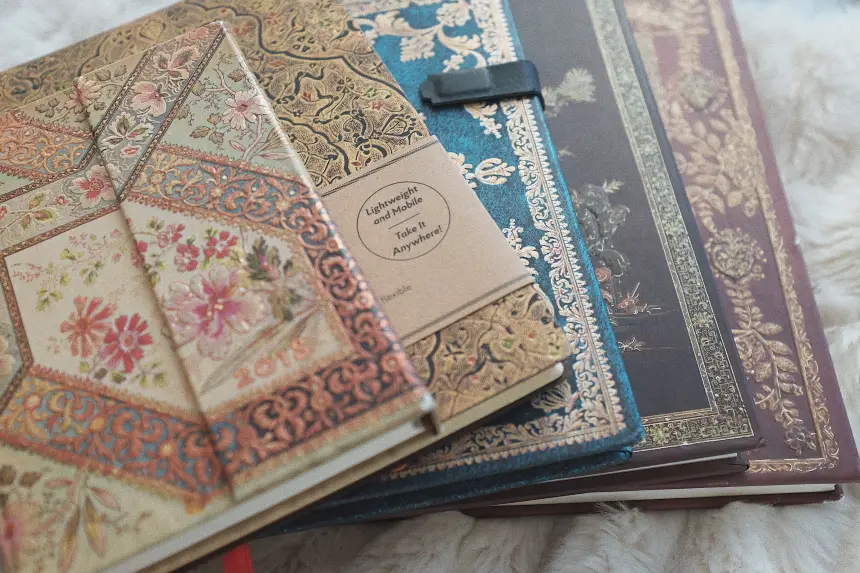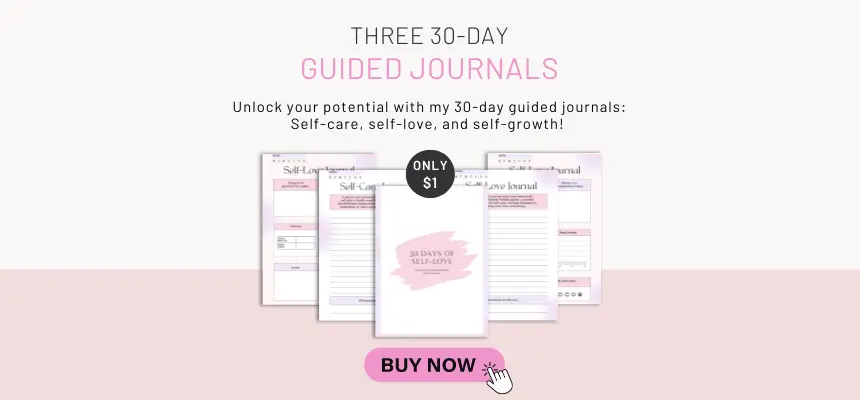My favorite boundary journal prompts
Let’s talk about journal prompts for setting boundaries.
In a world where personal boundaries are important for our well-being, relationships, and growth, it’s crucial to find effective ways to set and maintain them.
Journaling can help us do that by guiding us on a journey to establish healthy boundaries.
By reflecting on ourselves and using guided journaling prompts in our journal, we can learn more about who we are, feel stronger, and communicate our limits with confidence.
Without further ado, let’s explore some journal prompts for setting boundaries that will help you discover your potential and create boundaries that make your life better.


This post may contain affiliate links. That is, if you click on a link and buy something I recommend, I will receive a small compensation at no additional cost to you.
75 practical journal prompts for boundaries
15 journal prompts for emotional boundaries
- Think about situations or feelings that make you feel tired or overwhelmed. How can you protect your emotions by setting boundaries in those situations?
- Think about a time when someone crossed your emotional boundaries. How did it make you feel? Why do you think your boundaries were violated?
- Write about a time when you found it difficult to express your emotions honestly. What stopped you from setting clear emotional boundaries? How can you overcome these challenges?
- Think about the people who support your emotional well-being. How can you strengthen those relationships while still having healthy emotional boundaries?
- Write about a time when you set emotional boundaries successfully. How did it make you feel, and how did it affect the relationship?
- Are there any patterns or things that often compromise your emotional boundaries? Why do they happen, and how can you overcome them?
- Reflect on a time when you put someone else’s needs before your own emotions. How did it affect you in the long run, and what can you learn from it to set better emotional boundaries in the future?
You might also like: Reconnect with joy using these journal prompts for healing your inner child
- Write a letter to yourself, reminding yourself that you have the right to feel and express your emotions without judgment. Remember your worth and the importance of setting emotional boundaries.
- Describe your ideal emotional support system. How would it feel to have people who respect and understand your emotions? What can you do to cultivate those relationships?
- Think about any topics or triggers that require emotional boundaries. How can you effectively communicate these boundaries to others?
- Reflect on any emotional boundaries you need to set with yourself. Are there emotions you tend to ignore? How can you have a healthier relationship with your emotions?
- Write about a time when someone dismissed your emotions. How did it affect you, and how can you protect yourself in the future?
- What emotional needs are important to you in relationships? How can you communicate these needs to your loved ones?
- Think about any guilt or discomfort you feel when asserting your emotional boundaries. Why do you feel this way, and how can you prioritize your emotional well-being?
- Reflect on a situation where you compromised your emotional boundaries to avoid conflict. How can you prioritize your emotions and set healthier boundaries in similar situations in the future?

10 journal prompts about setting physical boundaries
- Think about a recent time when someone crossed your physical boundaries. How did it make you feel, both emotionally and physically? What can you do to prevent similar situations in the future?
- Describe your ideal physical space where you feel safe and respected. How can you create and maintain that space in your daily life? What boundaries do you need to set to take care of your physical well-being?
- Write about a situation where you compromised your physical boundaries to please others or avoid conflict. How did it affect your well-being? What can you learn from this experience to set healthier physical boundaries moving forward?
- Think about physical contact or proximity that makes you uncomfortable. What are your personal boundaries regarding physical contact? What challenges do you face in asserting and maintaining these boundaries? How can you overcome them?
- Journal about a time when you successfully communicated and protected your physical boundaries. How did it make you feel, and how did it affect the situation or relationship? What lessons can you learn from this experience?
- Reflect on physical environments or situations that drain your energy or make you uncomfortable. How can you establish boundaries to protect your physical well-being in those situations? What actions can you take to create a more supportive environment?
- Describe your preferences and limits when it comes to personal space and physical touch. How can you effectively communicate these boundaries to others? How can you ensure that your boundaries are respected?
- Write about physical activities or experiences that push your limits and make you uncomfortable. How can you set boundaries to participate in these activities at a pace that feels comfortable for you?
- Explore any guilt or hesitation you feel about asserting your physical boundaries. What beliefs or expectations contribute to these feelings? How can you challenge and overcome them to prioritize your physical well-being?
- Reflect on the physical boundaries you need to set with yourself. Are there habits or behaviors that compromise your physical well-being? How can you establish self-discipline and self-care practices to honor your boundaries and take care of your health?
You might also like: Cultivate authentic connections with journal prompts for healing trust issues
15 journal prompts about your work and time boundaries
- Think about how you balance your work and personal lives. How do you feel about the time and energy you spend on work? What changes can you make to have a better balance and prioritize your personal life?
- Describe how you would like to blend your and your personal life. What do a balanced schedule and boundaries look like to you? How can you create limits that let you do well in your career while enjoying your personal life?
- Write about a time when work took up too much of your personal time. How did it affect your well-being and relationships? What can you do to set clearer boundaries between work and your personal life?
- Reflect on your daily or weekly routines. Are there work-related tasks that consistently take away your personal time? How can you set boundaries for these tasks so you have time for self-care and fun?
- Explore why it’s challenging for you to say “no” to work requests or extra responsibilities. What fears or beliefs stop you from setting limits? How can you overcome these challenges and create stronger boundaries?
- Journal about what matters to you outside of work. What activities, relationships, or hobbies do you value and want to spend time on? How can you set boundaries at work to make sure you have time and energy for these important parts of your life?
- Reflect on how technology affects your work-life balance. How do you manage your use of technology outside of work? Are there any changes you can make to have healthier boundaries and fewer digital distractions?
You might also like: Amazing journal prompts to try this August
- Write about a time when you successfully told your colleagues or bosses about your work boundaries. How did it affect your work-life balance and well-being? What can you learn from that experience to set clearer boundaries in the future?
- Describe your ideal work schedule. How can you arrange your work hours to match your productivity and personal preferences? What can you do to advocate for a schedule that supports your well-being?
- Explore any signs of burnout or excessive stress caused by work. How can you set boundaries to prevent burnout and take care of your mental and physical health? Are there specific self-care practices you can try to support your well-being?
- Reflect on the boundaries you want to set for emails, messages, and work-related communication outside of work hours. How can you let people know when you are available to maintain a healthy work-life balance?
- Journal about any work-related tasks that drain your energy or don’t bring you much joy. How can you set boundaries to delegate or minimize these tasks so you can focus on the things that you’re good at and enjoy?
- Write about your ideal vacation or time off from work. How can you set boundaries and let people know that you’re taking a break to rest and recharge?
- Reflect on any blurred lines between work and personal relationships. Are there situations where work-related conversations or expectations spill over into your personal life? How can you establish boundaries to keep work and personal lives separate?
- Describe the work goals you want to achieve in the next year. How can you set boundaries to prioritize your time and efforts toward these goals while still having a healthy work-life balance?
15 journal prompts for relationships, friendships, and family boundaries
- Think about a relationship where your boundaries are regularly crossed. How does it affect how you feel and the relationship itself? What can you do to set clearer boundaries and talk about them effectively?
- Describe your ideal friendship or relationship. What do you expect, and what are your limits when it comes to communication, trust, respect, and personal space? How can you tell others about these boundaries to have healthier and more satisfying connections?
- Write about a time when you didn’t stick to your boundaries in a relationship because you wanted to avoid conflict or make the other person happy. How did it make you feel, and what can you learn from that experience to have stronger boundaries in the future?
- Reflect on any family situations that make it hard for you to have boundaries. Are there certain family members or circumstances where your boundaries are often tested or ignored? How can you create and follow boundaries within your family?
- Journal about a relationship or friendship where you were able to communicate and keep your boundaries intact. How did it improve how you felt and the relationship itself? What can you learn from that experience to have healthier boundaries in other connections?
- Explore any fears or worries you have about asserting your boundaries in relationships. What beliefs or past experiences contribute to these fears? How can you overcome them to prioritize your well-being?
- Write about the boundaries that you won’t compromise on in relationships and friendships. What actions, behaviors, or treatments are not acceptable to you? How can you explain these boundaries clearly and confidently to others?
- Reflect on the balance between giving and receiving in your relationships. Do you tend to put others’ needs before your own? How can you set boundaries that make sure there’s a healthy exchange and prevent burnout or resentment?
- Describe any emotional or physical boundaries you need to set with specific people in your life. What can you do to communicate these boundaries and take care of yourself in those relationships?
- Write about your personal values and how they connect with your boundaries in relationships and friendships. How can you make sure your boundaries support and reflect your core beliefs and principles?
You might also like: These journal prompts will help you understand and guide your intuition
- Think about a time when you felt bad for setting boundaries. Why did you feel that way, and how can you overcome those feelings to take care of yourself and set better boundaries in the future?
- Journal about how important it is to communicate openly and honestly when it comes to setting and keeping boundaries in relationships. How can you improve your communication skills to express your boundaries well and listen to others’ boundaries?
- Write about a situation where you had to deal with conflicting boundaries with someone close to you. How did you handle it, and what did you learn? How can you handle similar conflicts in the future while still being kind and respectful?
- Reflect on how self-care and being kind to yourself help you maintain healthy boundaries in relationships and friendships. How can you prioritize your well-being without feeling bad or selfish?
- Describe the qualities you value in relationships and friendships. How can you set boundaries that attract and build connections with people who respect and value your boundaries?

15 journal prompts for setting financial boundaries
- Think about how you feel about your money and spending habits. Do you feel good about your financial situation? Are there changes you can make to improve how you handle money?
- Describe what you want to achieve with your money. Do you want to save, pay off debts, or invest? How can you set limits to make sure your financial choices help you reach your goals?
- Write about a time when you felt your financial boundaries were ignored. What caused this situation? How can you set clearer boundaries to protect your finances in the future?
- Think about times when you spend money impulsively or based on emotions. What makes you do that, and how can you set boundaries to make more thoughtful financial decisions?
- Journal about what you believe and think about money. How do these ideas affect your financial boundaries? Are there any beliefs that limit you and need to change for better financial boundaries?
- Explore the difficulties you face when saying “no” to financial requests or pressure from others. How can you establish limits on lending money, giving financial support, or sharing expenses to match your goals?
- Write about what you value most when it comes to money. How can you set boundaries to make sure your spending aligns with your values and plans for the future?
- Reflect on the financial boundaries you need to set for yourself. Are there habits or indulgences that harm your finances? How can you be disciplined and set boundaries to prioritize financial stability?
- Describe the kind of financial support system you want. How can you set boundaries with family and friends about money? What steps can you take to create a supportive network that respects your financial boundaries?
- Journal about a time when you successfully communicated and enforced your financial boundaries. How did it help you financially and change the situation? What can you learn from that experience to set clearer financial boundaries in the future?
- Think about any financial mistakes or challenges you’ve faced. How can you learn from them and set boundaries to prevent similar situations in the future? What resources or strategies can you use to support your financial boundaries?
- Write about any pressures or influences that make it hard to maintain your financial boundaries. How can you deal with them and set boundaries that protect your financial well-being and goals?
- Explore any guilt or shame you feel about money and financial boundaries. Where do these feelings come from, and how can you overcome them to have healthier financial practices and boundaries?
- Reflect on how to balance generosity with financial boundaries. How can you be generous while still protecting your finances? Are there specific causes or organizations you want to support within your boundaries?
- Describe the financial boundaries you want to set. What actions can you take to enforce these boundaries and build a strong financial foundation? How can you review and adjust your financial boundaries regularly as your situation changes?

FAQ: What are boundaries?
Imagine that boundaries are like guardrails in your life. They help guide your relationships, work, and take care of yourself. Boundaries are the limits we set for our emotional, physical, and mental health.
For example, let’s say you have a friend who calls you late at night to talk about their problems. It leaves you tired and unable to take care of yourself.
By setting a boundary, you kindly tell them that you’re only available for calls at certain times. This gives you space to rest and take care of yourself.
At work, you can set boundaries by telling others when you’re available and how much work you can handle. This helps prevent feeling overwhelmed and helps you balance work and your personal life.
Setting these boundaries creates an environment where your needs are respected and you can be your best self.
Remember, boundaries aren’t about pushing people away. They’re about having healthier relationships and respecting yourself.
When you set and communicate your boundaries, you show others how you want to be treated and give yourself the freedom to be true to who you are.

FAQ: Why are boundaries important?
Preservation of energy
Boundaries act as protectors of our precious energy. They allow us to conserve and channel our energy into activities that align with our values and aspirations.
By setting limits on how much we give of ourselves, we can avoid burnout and maintain a sustainable level of enthusiasm and vitality.
Healthy relationships
Boundaries are the foundation of healthy and fulfilling relationships. They help us establish clear expectations and communicate our needs effectively.
When we respect our own boundaries and those of others, we foster trust, understanding, and mutual respect. This creates a nurturing environment for genuine connections to flourish.
Personal growth
Boundaries provide the space and freedom necessary for personal growth and self-discovery. They allow us to explore our passions and pursue our dreams.
We’ll be able to set goals without being overwhelmed by external pressures or distractions.
When we create boundaries around our time, commitments, and personal space, we can focus on our personal development with clarity and intention.
Emotional well-being
Boundaries play a vital role in protecting our emotional well-being. They allow us to create a healthy separation between our emotions and those of others.
This prevents us from taking on unnecessary stress or becoming entangled in toxic dynamics. By setting emotional boundaries, we cultivate resilience, self-awareness, and emotional balance.
FAQ: How do I set boundaries?
Reflect on your needs
The first step in setting boundaries is to take a deep dive into your inner world. Reflect on your values, priorities, and the areas of your life where you feel your boundaries have been crossed or neglected.
Ask yourself what’s truly important to you and what you need to feel respected, fulfilled, and balanced.
Define your limits
Once you have a clear understanding of your needs, it’s time to define your limits. Consider your emotional, physical, and mental well-being.
What behaviors or situations make you uncomfortable or drain your energy? Be specific and establish clear guidelines for what’s acceptable and what’s not.
For example, if you find that constant interruptions at work hinder your productivity, set a boundary by establishing dedicated work hours where you communicate your availability for interruptions and focus time.
Communicate assertively
Setting boundaries isn’t just an internal process; it’s about effective communication. Practice assertiveness by expressing your needs and limits in a respectful and clear manner.
Use “I” statements to convey your feelings and expectations without blaming or criticizing others. Remember, you have the right to advocate for yourself.
For instance, if a friend consistently asks you to drop everything and help them without considering your own commitments, you can communicate your boundary by saying, “I value our friendship, but I need to prioritize my own responsibilities. I won’t be able to help at that time, but I’m available to support you later.”
Practice self-care
Boundary setting goes hand in hand with self-care. Prioritize activities that recharge and nourish you. Make time for rest, relaxation, hobbies, and activities that bring you joy.
By taking care of yourself, you reinforce the importance of your boundaries and set a positive example for others to respect them.
Be consistent and firm
Setting boundaries is an ongoing process that requires consistency and firmness. It’s natural for others to test your boundaries, especially if they’re accustomed to crossing them.
Stay committed to your limits and be prepared to enforce them when necessary. Remember, you deserve to be treated with respect and have your boundaries honored.
Adjust and reevaluate
As you grow and evolve, your boundaries may need adjustments. Life circumstances change. What worked before might not align with your current needs.
Regularly reassess your boundaries. Make the necessary adjustments to ensure they continue to serve you well.
You might also like: Gain courage by exploring fear through journal prompts about fear
FAQ: How can journaling help you set boundaries?
Self-reflection and awareness
Journaling provides a safe and private space for reflection. By engaging in regular writing sessions with the help of journal prompts for setting boundaries that you saw before, you tap into your inner thoughts and emotions.
This means you’ll gain a deeper understanding of yourself. Through this process, you become more aware of the areas where your boundaries have been crossed or where you’ve neglected your needs.
Clarifying your values and priorities
Setting boundaries starts with knowing your values and priorities. Journaling allows you to explore and clarify what truly matters to you.
By writing about your core beliefs, dreams, and aspirations, you gain clarity on what’s essential in your life. This self-awareness becomes the foundation upon which you can establish boundaries aligned with your values.
Identifying boundary-crossing patterns
Through boundary journaling, you can uncover recurring patterns of boundary violations.
By examining your past experiences, you can identify situations or relationships where your boundaries were repeatedly tested or disregarded.
Recognizing these patterns allows you to proactively address them, develop strategies, and set stronger boundaries in the future.
Articulating your boundaries
Writing in your personal boundary journal provides a safe space to articulate and refine your boundaries. Use your journal to express your needs, limitations, and expectations. Be specific and detailed.
Allow yourself to be honest and authentic in your communication. This process not only clarifies your boundaries for yourself but also prepares you to communicate them effectively to others.
Practicing assertive communication
Journaling can be a valuable practice ground for assertive communication. Use your journal to write out hypothetical conversations or role-play scenarios where you assert your boundaries confidently and respectfully.
By practicing these conversations in writing, you build your communication skills and boost your confidence for real-life situations.
Tracking progress and reflection
Keep a record of your boundary-setting journey in your journal. Document your successes, challenges, and lessons learned along the way. Reflect on how setting and maintaining boundaries have positively impacted your life.
This retrospective view will not only serve as a source of motivation but also provide insights and reminders when faced with new boundary-setting opportunities.
Did you find any good journal prompts for setting boundaries?

I consider myself an expert when it comes to positive affirmations, journaling, and inspirational quotes. My blog is all about spreading good vibes and helping you feel awesome! I’ve got loads of cool stuff for you to explore, like uplifting affirmations that can boost your confidence, fun journal prompts to spark your creativity, and inspiring quotes to motivate you every day. Let’s embark on this amazing journey together as we discover more about ourselves, uncover our hidden strengths, and create a life that’s full of happiness and success.


